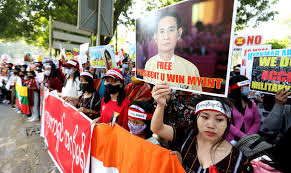Rights groups are sounding the alarm as Myanmar’s military regime continues its crackdown on dissent, with reports of recent executions and more planned. The rights groups warn that the junta is escalating its use of capital punishment against anti-coup activists, a troubling development in the ongoing crisis that has gripped the country since the February 2021 military takeover. This surge in executions represents a dire threat to human rights and democratic aspirations in Myanmar, demanding urgent international attention and action.
Recent Executions and Imminent Threats
According to the Women’s Peace Network, Maung Kaung Htet and his wife Chan Myae Thu were executed at 4am Myanmar time on September 23. The couple was convicted for their alleged involvement in a parcel bomb attack on Yangon’s Insein Prison in October 2022. Rights groups argue that their trial lacked due process and fairness, raising serious concerns about the legitimacy of the judicial proceedings.
More alarmingly, five additional pro-democracy activists face imminent execution. Kaung Pyae Sone Oo, Zeyar Phyo, Hsann Min Aung, Kyaw Win Soe, and Myat Phyo Myint were convicted in a closed court in May 2023 for the alleged fatal shooting of four police officers on a Yangon train. These activists have been imprisoned since September 2021, and their impending execution has sparked urgent calls for intervention from human rights organizations.
The Broader Context of Myanmar’s Crisis
The use of capital punishment by Myanmar’s military junta is set against a backdrop of escalating conflict and humanitarian crisis:
1. Renewed Offensives: The military faces intensified challenges from ethnic armed groups allied with pro-democracy forces across various regions of the country. This has led to increased violence and instability in many areas.
2. Mass Detentions: The Assistance Association for Political Prisoners reports that over 20,000 people are currently in detention, with 123 prisoners sentenced to death. This mass incarceration highlights the scale of the junta’s crackdown on opposition voices.
3. International Concerns: The United Nations, through its Independent Investigative Mechanism for Myanmar (IIMM), has expressed grave concerns about the executions. Nicholas Koumjian, head of the IIMM, stated that these executions might constitute crimes against humanity or war crimes, especially given the lack of public trials and due process.
Rights Groups Warning and Calls for Action
Human rights organizations are mobilizing to prevent further executions and draw international attention to the crisis:
1. ASEAN Intervention: ASEAN Parliamentarians for Human Rights (APHR) is urging the Association of Southeast Asian Nations to break its silence and speak out against the executions. Mercy Chriesty Barends, APHR chairperson, called on ASEAN foreign ministers to actively oppose the junta’s execution policy.
2. Concerns of Torture: APHR has reported that the five activists facing execution have endured torture and sexual violence without access to reliable legal support. This raises additional human rights concerns beyond the executions themselves.
3. Broader Implications: The Women’s Peace Network warned that these executions could embolden the junta to execute over 120 other detainees also facing death penalties on dubious charges.
The Impact of Executions on Myanmar’s Future
The use of executions as a tool of political repression has far-reaching consequences for Myanmar:
1. Silencing Dissent: Rights groups argue that the death penalty is being used to silence individuals with dissenting views, effectively stifling political opposition and civil society.
2. International Relations: The executions could further isolate Myanmar’s military regime on the global stage, potentially leading to increased sanctions or diplomatic pressure.
3. Humanitarian Crisis: The ongoing violence, mass detentions, and now escalating executions contribute to a worsening humanitarian situation in the country, with implications for regional stability.
As rights groups warn of more executions of anti-coup activists, the international community faces a critical moment to respond to the crisis in Myanmar. The junta’s use of capital punishment against political opponents represents a severe escalation in its efforts to crush dissent and consolidate power. Urgent action is needed from regional bodies like ASEAN, as well as the broader international community, to pressure the military regime to halt these executions and respect human rights. The situation in Myanmar remains volatile, with the lives of numerous activists hanging in the balance, underscoring the need for swift and decisive intervention to prevent further loss of life and to support the country’s struggle for democracy and human rights.
Related News
















